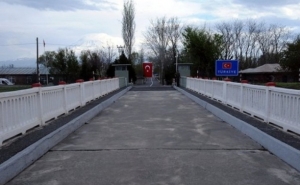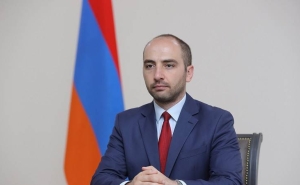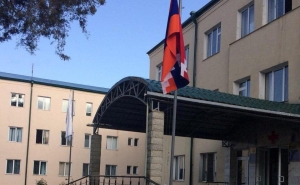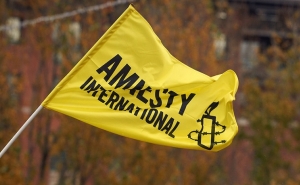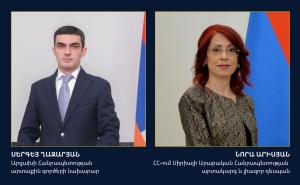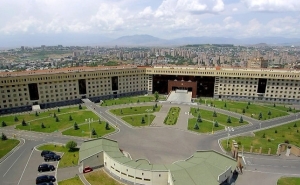 What Did Vienna Meeting Give to Azerbaijan?
What Did Vienna Meeting Give to Azerbaijan?
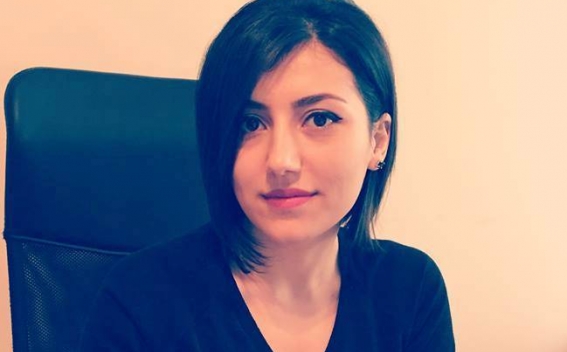
On May 16 in Vienna by the initiative of the American side the meeting of the Presidents of Armenia and Azerbaijan took place in which the representatives of foreign affairs of the co-chair states (Foreign Minister of Russia Sergey Lavorv, State Secretary of the US John Kerry and French Minister of State for European affairs, Harlem Désir) also took part. It was the first meeting between Sargsyan and Aliyev after the April four-day war.
What were the results of the meeting?
First, in the statement made by the OSCE Minsk Group Co-Chairs it is stated that they reaffirm that: "the conflict cannot have a military solution." The Co-Chairs emphasized the importance of preserving the 1994 and 1995 ceasefire agreements. This is what refers to the Co-Chairs and to their positions.
As for the points agreed by the Presidents of Armenia and Azerbaijan, then according to the joint statement of the OSCE Minsk Group Co-Chairs, they are as follows:
- The presidents reaffirms their commitment to the ceasefire regime and peaceful resolution of the conflict,
- In order to reduce the possibility of future violence they agreed to finalize the initiative of an investigation mechanism in a possible shortest term,
- The presidents agreed to expand the office of Special Representative of the OSCE Chairperson-in-Office,
- They agreed to continue the exchange of the information about the missing person under the auspice of ICRC,
- The presidents agreed to hold the next stage of the negotiations in June in a mutually accepted place aiming at starting the negotiations on comprehensive conflict settlement.
In addition summarizing the results of the meeting the Russian Foreign Minister also noted that "the work on agreeing the final settlement parameters of Karabakh conflict will continue."
"Probably taking into consideration the tense enough situation among the sides we will be forced to do it stage by stage. There is a possibility of agreeing on the settlement parameters of the first stage. They were formulated in the framework of the Russian mediation and are in parallel to the common stance of the Co-Chairs as well as received the supports of the French and the US Co-Chairs," Lavrov stated. He also added that there is ground to assume that "the Armenian and Azerbaijani negotiators will be prone to formulate compromises."
What did Azerbaijan gain?
In Vienna Azerbaijan was forced to accept the failure of its military adventure. At the expense of hundreds of human casualties Azerbaijan was not able to realize its plans, which for sure could not be what Azerbaijan has today. Azerbaijan hoped to occupy at least one region by a swift war in order to dictate its conditions to the sides on the negotiating table.
It did not happen. On the contrary, the meeting in Vienna showed that the very Azerbaijan is the side, which should make concessions in the negotiations and after long years of refusal Azerbaijan was forced to give its consent to the deployment of investigation measures.
Azerbaijan was forced to concede and to agree to expand the office of Special Representative of the OSCE Chairperson-in-Office, which become one of the main agreements of the Vienna meeting. Although today Azerbaijan tries to question its consent: "There can be no essential changes in Andrzej Kasprzyk’s powers. It is the position of Minsk Group mentioned there and we took no responsibility in that," Deputy Head of the Presidential Administration of Azerbaijan Novruz Mammadov stated. It turns out that the Azerbaijani side being forced to give its consent to this point avoids voicing it searching for other comments.
After Vienna meeting Azerbaijan and its President Ilham Aliyev were forced to accept the results of April four-day war. Azerbaijan realized that it cannot resolve Karabakh conflict in a military way. Vienna meeting participants also understand it.
Azerbaijan also understands that they cannot be given another opportunity to resort to military adventurism. The political, military, financial and other resources invested in closing eyes on Azerbaijan’s actions, in giving a late response and in other things will not be easy to regain either.
What refers to Vienna meeting and its results that can be positive for Azerbaijan, then they are as follows:
First, in essence Azerbaijan questioned the importance of preserving 1994 and 1995 ceasefire agreements which was emphasized by the Co-Chairs. This is the reason why Deputy Head of the Presidential Administration of Azerbaijan Novruz Mammadov declared that "in Vienna meeting Azerbaijan agreed on continuing the negotiations on further strengthening ceasefire regime." That is Azerbaijan once more pointed to the ceasefire agreement reached on April 5, but not to the ceasefire agreement reached in 1994 and 1995, once more avoiding to voice it.
And finally probably the most important: Azerbaijan was not punished for launching wide-scale military aggression. It was not forced to move its forces back to the positions before April 1, the unacceptability of the use or threat of the use of force was not confirmed in any way ( just the commitment to the ceasefire regime and peaceful resolution of conflict was re-confirmed).
The OSCE Minsk Group Co-Chairs trying to please the sides again avoided addressed statements without defining an appropriate punishments for an aggressor. Azerbaijan, by force of habit, will perceive this as a "green light" to turn to provocations in the future as well.
Other materials on this subject
- Russian forces have clearly failed in their duties: senators press Biden Administration to break Azerbaijan’s blockade The United States cannot stand aside while the Aliyev regime callously threatens the lives of Nagorno-Karabakh’s citizens, and must hold Azerbaijan to account for blocking a civilian population’s access...
- US calls for the full restoration of free movement through the Lachin Corridor "We remain concerned about impeded access to the Lachin Corridor and the humanitarian implications of this situation. This sets back the peace process and undermines international confidence. We call for...
- Azerbaijani forces violate the ceasefire in Artsakh The ceasefire violation was reported to the command of the Russian peacekeeping troops.
- Azerbaijani units violate ceasefire in several directions, Artsakh’s Defense Ministry says The Armenian side has no losses. The incidents of ceasefire violations were reported to the command of the Russian peacekeeping troops.
- Russian Diplomat Reassures Armenians Over Corridor In Karabakh "The parties are in direct contact, and I assure you that the peacekeepers will not move a single centimeter until there is a new corridor," Seleznyov said.
-
 17:08
17:08The regular session of the Anti-corruption Policy Council takes place in Jermuk
-
 15:05
15:05The Prime Minister sends congratulatory messages to the supreme leader of Iran and the President of Iran
-
 11:11
11:11Armenia sends earthquake aid to Turkey
-
 10:43
10:43Commemoration of the Pontiff St. Sahak Partev
-
 09:16
09:16Some roads are closed and difficult to pass in Armenia
-
 19:55
19:55Phone conversation of the Foreign Minister of Armenia with the U.S. Assistant Secretary of State for European and Eurasian Affairs
-
 18:30
18:30Prime Minister Pashinyan and President Khachaturyan meet
-
 18:20
18:20Ararat Mirzoyan with Co-Chairman of the OSCE Minsk Group of France Brice Roquefeuil
-
 17:01
17:01Humans could land on Mars within 10 years, Musk predicts
-
 16:45
16:45France, US urge 'immediate' end to Nagorno Karabakh blockade
-
 16:01
16:01Blockaded Nagorno Karabakh launches fundraiser to support quake-hit Syria
-
 15:59
15:59Earthquake death toll in Turkey rises to 18,342
-
 15:43
15:43Ararat Mirzoyan Held a Telephone Conversation with Sergey Lavrov
-
 15:06
15:06French president rules out fighter jet supplies to Ukraine in near future
-
 14:47
14:475 Day Weather Forecast in Armenia
-
 14:44
14:44President Vahagn Khachaturyan wrote a note in the book of condolences opened in the Embassy of Syria in Armenia
-
 14:20
14:20Azerbaijan’s provocations impede establishment of peace and stability – Armenian FM tells Russian Co-Chair of OSCE MG
-
 12:57
12:57France representation to OSCE: Paris calls on Azerbaijan to restore freedom of movement through Lachin corridor
-
 11:40
11:40Command of Kosovo forces highly appreciated preparation of Armenian peacekeepers
-
 10:16
10:16The United States withdrew from sanctions against Syria for six months the provision of assistance after the earthquake
day
week
month
Humidity: %
Wind: km/h


